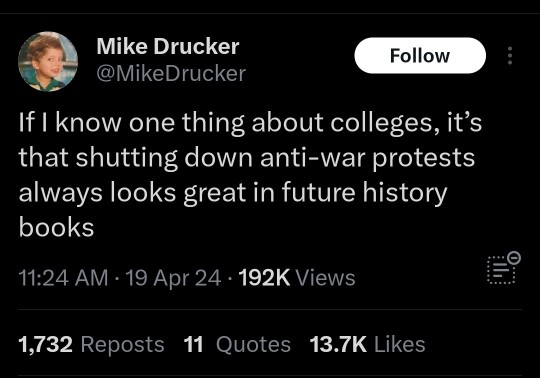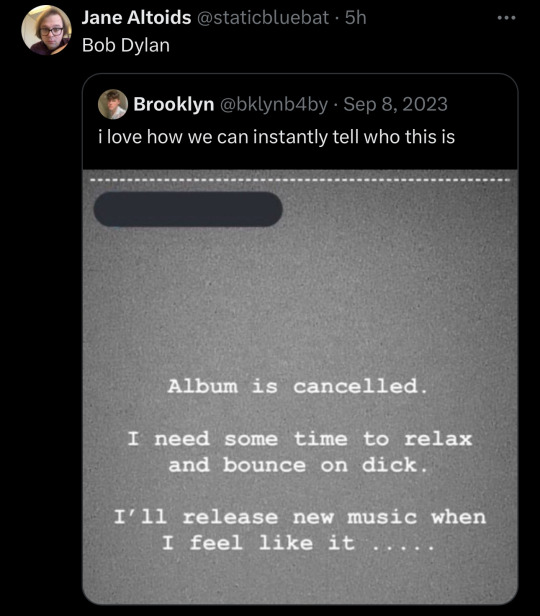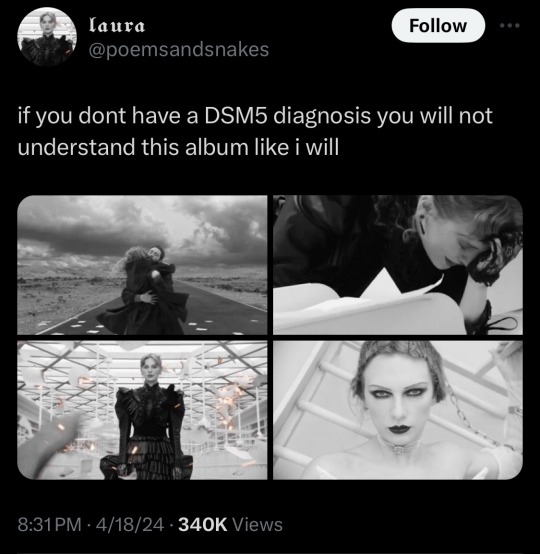Text
The politics of that Alex Garland Civil War movie are going to be so galaxy-brain levels of stupid I'm low-key looking forward to it
2K notes
·
View notes
Text
lol i hate today’s era of absolutely zero nuance takes. a friend didn’t behave exactly as you’d wanted them to? cut them off. a guy didn’t text you back instantly bc he has his own life? he’s just giving you breadcrumbs. doing something makes you uncomfortable? don’t do it anymore. someone isn’t instantly available for you? disinterest. just absolutist statements that often don’t apply to the multilayer situations of everyday life. like. stop. literally just stop it
110K notes
·
View notes
Text
The fourth way that anticommunist extermination programs shaped the world is that they deformed the world socialist movement. Many of the global left-wing groups that did survive the twentieth century decided that they had to employ violence and jealously guard power or face annihilation. When they saw the mass murders taking place in these countries, it changed them. Maybe US citizens weren't paying close attention to what happened in Guatemala, or Indonesia. But other leftists around the world definitely were watching. When the world's largest Communist Party without an army or dictatorial control of a country was massacred, one by one, with no consequences for the murderers, many people around the world drew lessons from this, with serious consequences.
This was another very difficult question I had to ask my interview subjects, especially the leftists from Southeast Asia and Latin America. When we would get to discussing the old debates between peaceful and armed revolution; between hardline Marxism and democratic socialism, I would ask:
"Who was right?"
In Guatemala, was it Árbenz or Che who had the right approach? Or in Indonesia, when Mao warned Aidit that the PKI should arm themselves, and they did not? In Chile, was it the young revolutionaries in the MIR who were right in those college debates, or the more disciplined, moderate Chilean Communist Party?
Most of the people I spoke with who were politically involved back then believed fervently in a nonviolent approach, in gradual, peaceful, democratic change. They often had no love for the systems set up by people like Mao. But they knew that their side had lost the debate, because so many of their friends were dead. They often admitted, without hesitation or pleasure, that the hardliners had been right. Aidit's unarmed party didn't survive. Allende's democratic socialism was not allowed, regardless of the détente between the Soviets and Washington.
Vincent Bevins, The Jakarta Method: Washington's Anticommunist Crusade and the Mass Murder Program that Shaped Our World
4K notes
·
View notes
Text

Viktor Tsoi with a painting of himself (1986)
paiting by Timur Novikov
2K notes
·
View notes
Text







disco elysium / l'internationale, eugene pottier / history, antonio gramsci / sacred and terrible air, robert kurvitz / revolution, vladimir mayakovsky / words of a rebel, peter kropotkin
#writing my thesis paper not even in college atm n going outside to beat my fists on the solid earth#de
161 notes
·
View notes
Text
Critical Theory Recommended Reading List:
Principles of Communism (Friedrich Engels)
Wage-Labour and Capital Value, Price and Profit (Karl Marx)
Das Kapital (Karl Marx)
The Communist Manifesto (Karl Marx)
On Practice & On Contradiction (Mao Zedong)
The Motorcycle Diaries (Che Guevara)
Latin America Diaries (Che Guevara)
Reminiscences of the Cuban Revolutionary War (Che Guevara)
Guerilla Warfare (Che Guevara)
Che (Jon Lee Anderson)
Socialism: Utopian and Scientific (Friedrich Engels)
The Origin of the Family, Private Property and the State (Friedrich Engels)
Orientalism (Edward W. Said)
The Unwomanly Face of War (Svetlana Alexievich)
The Wretched of The Earth (Frantz Fanon)
A Dying Colonialism (Frantz Fanon)
Black Skin White Masks (Frantz Fanon)
Inglorious Empire (Shashi Tharoor)
Remembering Che (Aleida March)
Against Empire (Michael Parenti)
Blackshirts & Reds (Michael Parenti)
Revolutionary Suicide (Huey P. Newton)
Confessions of an Economic Hitman (John Perkins)
The Mismeasure of Man (Stephen Jay Gould)
The State and the Revolution (V.I. Lenin)
Imperialism: The Highest Stage of Capitalism (V.I. Lenin)
Imperialism in The 21st Century (V.I. Lenin)
Liberalism A Counter History (Domenico Losurdo)
23 Things They Don't Tell You About Capitalism (Ha-Joon Chang)
October (China Miéville)
Kill Anything That Moves (Nick Turse)
Blitzed: Drugs in Nazi Germany (Norman Ohler)
Late Victorian Holocausts (Mike Davis)
Ten Myths About Israel (Ilan Pappe)
How Europe Underdeveloped Africa (Walter Rooney)
Reform or Revolution (Rosa Luxemburg)
Settlers: The Mythology of the White Proletariat (J. Sakai)
Killing Hope (William Blum)
Unequal Exchange and the Prospects of Socialism (Arghiri Emmanuel)
Unequal Exchange: A Study of Imperialism and Trade (Arghiri Emmanuel)
The Wealth of Some Nations (Zak Cope)
Divided World Divided Class (Zak Cope)
The Law of Worldwide Value (Samir Amin)
Unequal Development (Samir Amin)
An Economic History of the U.S.S.R (Alec Nove)
Human Rights in the Soviet Union (Albert Szymanski)
Is the Red Flag Flying? (Albert Szymanski)
Soviet Democracy (Pat Sloan)
The Industrialisation of Soviet Russia: The Socialist Offensive (R.W. Davies)
Soviet Communism: A New Civilisation (Sidney and Beatrice Webb)
Socialism in the Soviet Union (Jonathan Aurthur)
The Soviet Form of Popular Government (The U.S.S.R Academy of Sciences)
Workers Participation in the Soviet Union (Mick Costello)
The Great Conspiracy (Michael Sayers and Albert E. Kahn)
The Soviets and Ourselves: Two Commonwealths (K.E. Holme)
The Old Social Classes and the Revolutionary Movements of Iraq (Hanna Baratu)
South Yemen A Marxist Republic in Arabia (Robert W. Stookey)
The Arab Left (Tareq Y. Ismael)
Post-Marxism and The Middle East (Feleh A. Jabar)
The Unmaking of Arab Socialism (Ali Kodri)
The Hundred Years' War on Palestine (Rashid Khalidi)
The Ethnic Cleansing of Palestine (Ilan Pape)
A Strategy for the Liberation of Palestine (The Popular Front for the Liberation of Palestine)
Roadside Picnic (Arkady and Boris Strugatsky)
Blood in My Eye (George Jackson)
Why You Should Be a Trade Unionist (Len McCluskey)
The Pitfalls of Liberalism (Kwame Ture)
9 notes
·
View notes
Photo

Turkey, Haji Bektas city. A photo of Cuban revolutionary Che Guevara for sale above a picture of imam Ali, 2002.
710 notes
·
View notes
Text
No medication has ever worked on me because i’m not suffering from a mental disorder i’m experiencing divine madness
54K notes
·
View notes









